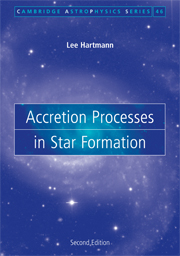Book contents
- Frontmatter
- Contents
- Preface to the first edition
- Preface to the second edition
- Acknowledgments
- 1 Overview
- 2 Beginnings: molecular clouds
- 3 Initial conditions for protostellar collapse
- 4 Protostellar cloud collapse
- 5 Protostellar collapse: observations vs. theory
- 6 Binaries, clusters, and the IMF
- 7 Disk accretion
- 8 The disks of pre-main-sequence stars
- 9 The FU Orionis objects
- 10 Disk winds, jets, and magnetospheric accretion
- 11 Disk accretion and early stellar evolution
- 12 Disk evolution and planet formation
- Appendix 1 Basic hydrodynamic and MHD equations
- Appendix 2 Jeans masses and fragmentation
- Appendix 3 Basic radiative transfer
- List of symbols
- Bibliography
- Index
1 - Overview
Published online by Cambridge University Press: 30 October 2009
- Frontmatter
- Contents
- Preface to the first edition
- Preface to the second edition
- Acknowledgments
- 1 Overview
- 2 Beginnings: molecular clouds
- 3 Initial conditions for protostellar collapse
- 4 Protostellar cloud collapse
- 5 Protostellar collapse: observations vs. theory
- 6 Binaries, clusters, and the IMF
- 7 Disk accretion
- 8 The disks of pre-main-sequence stars
- 9 The FU Orionis objects
- 10 Disk winds, jets, and magnetospheric accretion
- 11 Disk accretion and early stellar evolution
- 12 Disk evolution and planet formation
- Appendix 1 Basic hydrodynamic and MHD equations
- Appendix 2 Jeans masses and fragmentation
- Appendix 3 Basic radiative transfer
- List of symbols
- Bibliography
- Index
Summary
Much of what we presently know or surmise about the physical processes involved in star formation is derived from the detailed study of a few nearby molecular cloud “nurseries”. Stars in the solar neighborhood are formed from the gravitationally induced collapse of cold molecular gas. Typical molecular gas clouds must contract by a factor of a million in linear dimensions to form a star. Because of this dramatic (and rapid) reduction in size, any small initial rotation of the star-forming cloud is enormously magnified by conservation of angular momentum during collapse. In this way a modestly rotating gas cloud produces a rapidly rotating object – a disk – in addition to a small, stellar core at the end of gravitational collapse. Probably most of the material of a typical star is accreted through its disk, with a small amount left behind to form planetary systems.
Advances in observational techniques spanning the electromagnetic spectrum have been essential in developing our present understanding of star formation. The launch of the Infrared Astronomy Satellite (IRAS) in 1983 led to the recognition that dusty disks are common around young stars. The ISO infrared satellite provided detailed mid-infrared spectra of many bright disks. The Spitzer Space Telescope, the latest in this line of infrared observatories, has now detected mid-infrared disk emission in very large samples of stars spanning a wide range of ages.
Information
- Type
- Chapter
- Information
- Accretion Processes in Star Formation , pp. 1 - 20Publisher: Cambridge University PressPrint publication year: 2008
